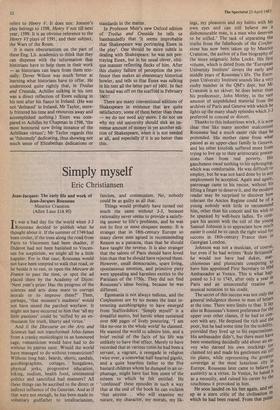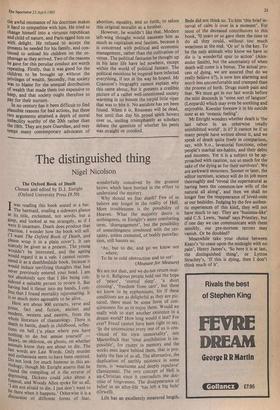Simply myself
Eric Christiansen
Jean-Jacques: The early life and work of Jean-Jacques Rousseau Maurice Cranston (Allen Lane £14.95) It was a bad day for the world when J-J
Rousseau decided to publish what he thought about it. If the summer of 1749 had been cooler, if the trees along the road from Paris to Vincennes had been shadier, if Diderot had not been banished to Vincen- nes for scepticism, we might all be a little happier. For in that case, Rousseau would not have been tempted to walk that road, or lie beside it to rest, or open the Mercure de France to pass the time, or spot the ad placed there by the Academy of Dijon: `Next year's prize: Has the progress of the sciences and arts done more to corrupt morals or to improve them?' Then, perhaps, 'that moment's madness' would not have siezed the parched wayfarer. It might not have occurred to him that 'all my little passions' could be 'stifled by an en- thusiasm for truth, liberty and virtue.'
And if the Discourse on the Arts and Sciences had not transformed John-James from a cranky. musicologist to an honoured sage, romanticism would have had to do without its patron saint. Would the world have managed to do without romanticism? Without long hair, beards, shorts, sandals, autobiographies, cottages, bungalows, physical jerks, progressive education, hiking, nudism, health food, sentimental politics and sanctified bad manners? All these things can be ascribed to the direct or indirect influence of the Genevan. And as if that were not enough, he has been made in- voluntary godfather to totalitarianism,
fascism, and communism. No, nobody could be as guilty as all that.
Things would probably have turned out much the same without J-J, because rationality never seems to provide a satisfy- ing answer to life's problems, and he was not its first or most eloquent enemy. It is stranger that in 18th-century Europe so many clever men agreed in recommending Reason as a panacea, than that he should have taught the reverse. It is also stranger that the salons of Paris should have loved him than that he should have rejected them. However, small democracies, spare living, spontaneous emotion, and primitive piety were appealing and harmless exotics to the Parisians of the 1750s. They did not find Rousseau's ideas boring, because he was different.
Egomania is not always tedious, and the Confessions are by no means the least in- teresting autobiography to have emerged from Staffordshire. `Simply myself' is a dreadful motto, but heroic when sustained over 600 pages of lively posturing. 'I am like no-one in the whole world' he claimed. He wanted the world to admire him, and a brief recital of the facts of his life was unlikely to have that effect. Merely to have recorded that at various times he had been a servant, a vagrant, a renegade in religion twice over, a somewhat half-hearted gigolo, and a quite heartless father to the five bastard children whom he dumped in an or- phanage, might have lost him some of the esteem to which he felt entitled. He 'confessed' these episodes in such a way that at the end of the book he can exclaim `that anyone... who will examine my nature, my character, my morals, my lik- ings, my pleasures and my habits with his own eyes and can still believe me a dishonourable man, is a man who deserves to be stifled.' The task of separating the truths from the falsehoods of the Confes- sions has now been taken up by Maurice Cranston, the author of a fine biography of the more enigmatic John Locke. His first volume, which is dated from the 'European University Institute' covers the early and middle years of Rousseau's life. The Euro- pean University Institute sounds like a very cushy number in the QM's dept, but Mr Cranston is no skiver; he does better than his predecessor, John Morley, in the vast amount of unpublished material from the archives of Paris and Geneva with which he lights up the many shady episodes which J-J preferred to conceal or distort.
Thanks to this industrious work, it is now clear that like many another malcontent Rousseau had a much easier ride than he pretended. His mother came from what passed as an upper-class family in Geneva, and his other kinsfolk suffered more from trying to live up to their aristocratic preten- sions . than from real poverty. His gaucheness owed nothing to his upbringing' which was comfortable. He was difficult to employ, but he was not hard done by in any employment he accepted. Again and again, patronage came to his rescue, without his lifting a finger to deserve it, and the modern reader may be surprised to discover how tolerant the Ancien Regime could be of a young nobody with little to recommend him, other than his conceit and his wish to be spanked by well-born ladies. To corn- pare his ascent with the toil of the young Samuel Johnson is to appreciate how much easier it could be to catch the right wind for success in 18th-century France than in Georgian London.
Johnson was not a musician, of course, but even if he had written 'Rule Britannia' he would not have had dukes, mar- chionesses and plutocrats conspiring to have him appointed First Secretary to HM Ambassador at Venice. This is what hap- pened to J-J to 1743, after only a year in Paris and an unsuccessful treatise 00 musical notation to his credit.
The secret of this success was not only the general indulgence shown to men of letters at the time. There were limits to that. It laY also in Rousseau's honest preference for the upper over other classes, if he had to con- sort with any. He despised the rich and the poor, but he had some time for the nobility, provided they lived up to his expectations. His ambassador didn't, but there must have been something decidedly odd about an en- voy who darned his own stockings (or claimed to) and made his gentlemen eat off tin plates, while representing the greatest sovereign at the most luxurious city in Europe. Rousseau later came to believe in austerity as a virtue. In Venice, he hated it as a necessity, and ruined his career by the touchiness it provoked in him. He soon landed on his feet again, and set up as a stern critic of the civilisation in which he had been reared. From that point
the awful resonance of his doctrines makes it hard to sympathise with him. He tried to change himself into a virtuous republican and child of nature, and Paris egged him on with delight. He refused to accept the presents he needed for his family, and con- tinued to unload his children on the or- phanage as they arrived. Two of the reasons he gave for this peculiar conduct are worth repeating. Firstly, that it was good for the children to be brought up without the privileges of wealth. Secondly, that society was to blame for the unequal distribution of wealth that made them too expensive to keep, and that society ought therefore to Pay for their nurture.
In no century has it been difficult to find Plausible reasons for bad actions, but these two arguments attained a depth of moral Imbecility worthy of the 20th rather than the 18th. They are pure Guardian, and may tempt many contemporary advocates of
abortion, equality, and so forth, to salute this original moralist as a brother.
However, he wouldn't like that. Modern left-wing thought would nauseate him as much as capitalism and fascism, because it is concerned with political and economic management, rather than the cultivation of virtue. The political fantasies he thought up in his later life have led nowhere, except within the world of political fantasy. The political emotions he inspired have infected everything, if not in the way he hoped. Mr Cranston's biography cannot explain why this came about, but it presents a credible picture of a rather well-intentioned society warming in its bosom the torpid little viper that was to bite it. No antidote has yet been found. When it is, Rousseau will be dead, but until that day his proud spirit hovers over us, smiling triumphantly as scholars debate the question of whether his penis was straight or crooked.











































 Previous page
Previous page